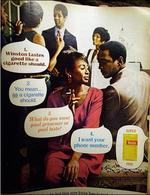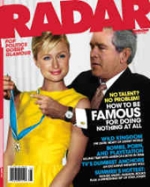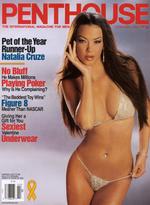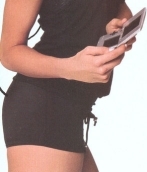After overpaying for Fast Company, becoming embroiled in Rosie O'Donnell's freaked out life and getting caught inflation its circulation figured for Rosie and YM, G + J has thrown in the towel and is selling itself to Meredith Corporation. Meredith, who will become the country's second largest publisher behind Time Inc. after the acquisition, will get G + J's Parents, Child, Fitness and Family Circle. G + J will try to sell Fast Company and and Inc. on its own before June 30, the date the Meredith/G + J deal finalizes.
Orchestrating the deal was G + J's Russell Denson who is said to be the master of prepping publishing companies for sale.
Working with Crispin Porter + Bogusky on its Mantropy Control Center project for Maxim Magazine, J.J. Sedelmaier, co-creator of The Ambiguously Gay Duo with Robert Smigel for Saturday Night Live, has developed three cartoons for Mantropy which feature the Maxim Ranger and aim to help men protect their masculinity.
Riffing on the Metrosexual thing, the three cartoons, "Nowhere Fast," "Threatened Hairitage" and "Walk Like a Man," hope to protect men from partaking in activities thought to maintain one's youth but, in reality, just make a man look stupid.
Here's an interesting ad from the old school days. Back when smoking was cool, Winston had the headline, "Winston takes good like a cigarette should," which according to grammar Nazis was incorrect leading to tremendous levels of free publicity when the utterance of that headline would often come with the reply, "Winston Tastes good as a cigarette should." As is often the case, the grammatically incorrect version sounded far more natural than the correct version.
The ad belittles that whole debate, as flickr user ChicagoEye points out, and gets to the real heart of the ad's visual: the hook up. The third thought bubble, spoken by the woman, says "What do you want good grammar or good taste?" to which the man replies, "I want your phone number." Assuming this was a real ad, it's a terrifically insiderish approach to the whole grammar debate. Much like the debate we have here on Adrants. To wit, "Do you want good grammar or good advertising news?"
While you have no doubt already read about this 3,000 times over at Gawker, we thought we cover it here for completeness. So, here goes. Radar, the Mahr Roshan's snarkomag, which failed after two issues a year ago, has relaunched. Yes, it's back. That's it. End of story. Oh, if you really must have details, Gawker breaks the first issue down here.
Giving itself a nip and tuck, Penthouse, with its July issue, has decided to eliminate the cheesy, back of the book sex ads. Explaining the move, Penthouse Media Group CEO Marc Bell told the New York Post, "Traditional advertisers just didn't want to advertise with that in the back of the book. " Yes, Marc. Good call. It is a bit difficult to concentrate on, oh, say, a car ad when distracted by all those hot dial-a-slut ads. Editorially, the magazine is going all laddie book, adding sports, music and gadget columnists. Oh, for those pre-landing strip, saline-free, mag between the mattress and the box spring days of old.
There's always that debate that goes on in a guy's mind when it comes to the type of woman best suited to offering a good time or, long term, providing a nice life. Nintendo has put that debate to rest - at least for a few minutes - by giving guys both in the form of good girl, bad girl NintendoDS ads in Stuff Magazine. The good girl promises to be in control whether on top or or on bottom. The bad girl "likes to touch as hard or as fast as she wants." Take your pick, guys.
Bostonist points out the May issue of Boston Magazine looks strikingly similar to the cover of the February issue of Texas Monthly. Both covers contain the word, "Power, in green, emblazoned across black and white photos. Both issues are "power" issues which feature each regions most influential people. Explaining the situation in an oddly circular manner, Boston Magazine Editor Jon Marcus said, "It's done and it's been done to us a lot. We, as a matter of principle, haven't done it and don't do it." OK, then.
In the face of all those high profile, overpriced, try oh-so-hard to be oh-so-cool consumer television campaigns, business to business print campaigns usually get about as much attention as an agency traffic manager. We're doing our part to change that by highlighting a recent print campaign for Tekelec, a telecommunications solutions, network performance management technology and value-added applications company. Oh yes, there's only a few in the world who even know or care what that means but without this type of company, there'd be no functioning networks over which to have that elicit online affair or, on a more more utilitarian note, check email.
With the tagline, "Tools For What's Next," the Tekelec print ads speak to the fast changing world of networking and the company's nimble approach to helping companies react to and plan for fast approaching technologies such as GPRS, 3G, VoIP, IPTV, SIP, LNP, CALEA and IMS. Don't stretch your brain muscle too much, we worked in tech advertising a long time and we still don't know what some of those terms mean. The point of the campaign is that Tekelec does and they're riding the technology wave right along with you. Work was done by Hanft Raboy & Partners. You can see the full sized ads here, here and here. (They're PDF's)

|
|







